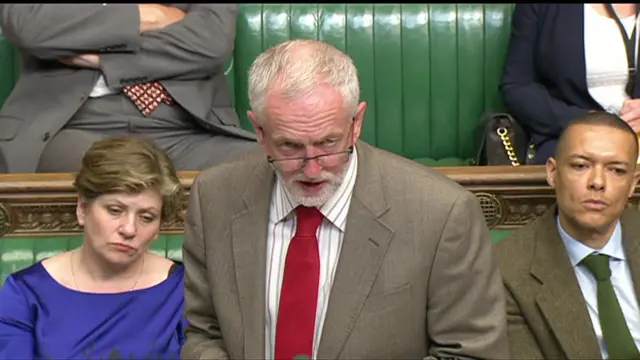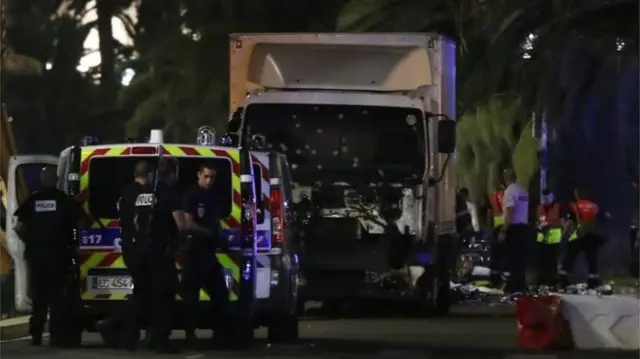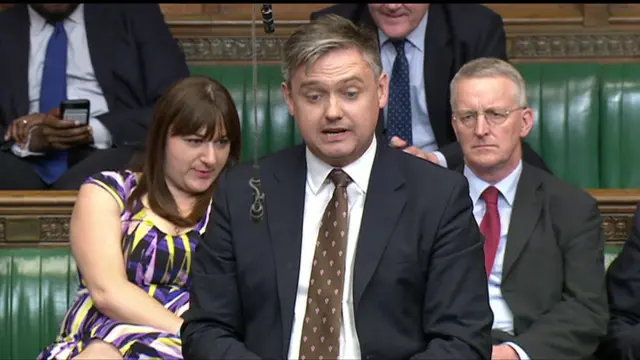Labour MP questions Corbyn on party policypublished at 17:38 BST 18 July 2016
Labour MP Neil Coyle questions leader Jeremy Corbyn on the party's policy on nuclear weapons, exposing the divisions within the party.
Court rejects challenge to Jeremy Corbyn automatically being on Labour ballot
Boris Johnson meets French counterpart in Paris
Theresa May holds Brexit talks in Slovakia and Poland
Hinkley Point nuclear plant set to get final investment approval
Aiden James, Victoria King, Pippa Simm, Alex Hunt, Gavin Stamp and Tom Moseley
Labour MP Neil Coyle questions leader Jeremy Corbyn on the party's policy on nuclear weapons, exposing the divisions within the party.
Allow X content?
This article contains content provided by X. We ask for your permission before anything is loaded, as they may be using cookies and other technologies. You may want to read X’s cookie policy, external and privacy policy, external before accepting. To view this content choose ‘accept and continue’.
Trident debate
 House of Commons
House of Commons
Parliament
Responding to some hostile questioning, Jeremy Corbyn replies that "parties review party policy".
This is why Labour have a defence review under way, in order to "to look at issues of employment of and investment" and the necessity of having government intervention "through defence diversification" to support industries that become "over-reliant on defence contracts".
He says many MPs will vote for the motion tonight because they think nuclear weapons work, but points out the motion does not address the costs.
Tonight's motion would not allow Britain to move to a nuclear free world, he says.
"In case it's not obvious I will actually be voting against this motion tonight," he tells MPs.
Trident renewal debate
 House of Commons
House of Commons
Parliament
Today's motion proposes an "open ended commitment to nuclear capability" for as long as is needed.
What we are talking about here is "weapons of mass destruction", Jeremy Corbyn argues.
Each of the the 40 warheads is "eight times as powerful as the atomic bomb which killed 140,000 in Hiroshima" and is capable of killing "more than one million people".
"What is the threat we are facing that one million people's deaths actually deters?" he asks, pointing out the nuclear deterrent did not stop the formation of the so-called Islamic State, atrocities in Yemen, the Saddam Hussein regime, the war crimes in the Balkans, nor the genocide in Rwanda.
"The threat of mass murder is not a legitimate way to go about international relations," he argues.
Where will the successor submarines be based, he asks, given that "the people of Scotland have objected" to it being maintained in Scotland.
 House of Commons
House of Commons
Parliament
"We are not discussing a nuclear deterrent but our continuing possession of weapons of mass destruction," Jeremy Corbyn tells MPs.
He argues that nuclear weapons did not deter the "poisonous death cult" of so-called Islamic State, Saudi Arabia's actions in Yemen, "Saddam Hussein's atrocities in the 1980s... war crimes in the Balkans in the 1990s nor the genocide in Rwanda".
Quote MessageI do not believe the threat of mass murder is a legitimate way to go about dealing with international relations."
BBC political correspondent tweets...
Allow X content?
This article contains content provided by X. We ask for your permission before anything is loaded, as they may be using cookies and other technologies. You may want to read X’s cookie policy, external and privacy policy, external before accepting. To view this content choose ‘accept and continue’.
Allow X content?
This article contains content provided by X. We ask for your permission before anything is loaded, as they may be using cookies and other technologies. You may want to read X’s cookie policy, external and privacy policy, external before accepting. To view this content choose ‘accept and continue’.
Trident renewal debate
 House of Commons
House of Commons
Parliament

Labour Leader Jeremy Corbyn welcomes Theresa May to her position as PM, saying he's glad her election was "quick and short".
He supports her words on the attacks in Nice; and endorses her comments on Turkey, paying tribute to Foreign Office staff who have helped UK citizens.
Turning to Trident, he says this motion is an opportunity to scrutinise what the government is doing.
He says it is considering the "complex moral and strategic issues". He asks whether these weapons of mass destruction act as a deterrent and "is that deterrent credible".
And he asks whether the costs of Trident renewal are justifiable. He says he has seen estimates "as high as £200bn".
Nice attack statement
 House of Lords
House of Lords
Parliament
 Image source, AFP
Image source, AFPPeers are now listening to the repeat of a statement made earlier by the home secretary on Thursday's attack in Nice, where a lorry killed 84 people.
Troops are to be redeployed to tourist spots as inquiries continue into the killer's possible links to jihadists.
Interior Minister Bernard Cazeneuve said the investigation had not yet found evidence linking attacker Mohamed Lahouaiej Bouhlel to terrorist networks.
Newly promoted Home Office Minister Baroness Williams of Trafford tells peers that the threat to the UK from international terrorism "remains at severe".
This means "attacks are highly likely" but the public "should not be alarmed".
The UK security services have "reviewed our security measures" and have "assured [the home secretary] protections are in place" including the national barrier asset - which implements security fences and gates to physically protect sites.
All police forces have reviewed security measures for upcoming events in their area, she adds.
Amber Rudd: UK terror threat "remains at severe"
BBC chief political correspondent tweets...
Allow X content?
This article contains content provided by X. We ask for your permission before anything is loaded, as they may be using cookies and other technologies. You may want to read X’s cookie policy, external and privacy policy, external before accepting. To view this content choose ‘accept and continue’.
Trident debate
 House of Commons
House of Commons
Parliament
In response to a question from the SNPs George Kerevan, Theresa May says she is prepared to launch "an attack that would result in the death of 100,000 innocent men women and children".
"The whole point of deterrent is that our enemies need to know we would be prepared to use it," she tells MPs, referencing Jeremy Corbyn's announcement he would not launch nuclear weapons.
"Stopping nuclear weapons globally is not achieved unilaterally," she tells MPs, "it is part of a multilateral process".
The UK is committed to "creating conditions" that allow a world without nuclear weapons and will "continue to push for key steps towards nuclear disarmament".
Allow X content?
This article contains content provided by X. We ask for your permission before anything is loaded, as they may be using cookies and other technologies. You may want to read X’s cookie policy, external and privacy policy, external before accepting. To view this content choose ‘accept and continue’.
Trident renewal debate
 House of Commons
House of Commons
Parliament
Theresa May says, over 35 years, the cost of Trident replacement amounts to 0.2% of total government spending.
The running costs would amount to 6% of the MoD’s budget.
She says a government review in the last Parliament backed the continuous at-sea deterrence - which requires four submarines, her second point.
Mrs May says she "does not accept" the argument that future technology will make nuclear submarines obsolete.
Having three submarines would be a "false economy" and she "will not sacrifice security for a false economy", she says.
Allow X content?
This article contains content provided by X. We ask for your permission before anything is loaded, as they may be using cookies and other technologies. You may want to read X’s cookie policy, external and privacy policy, external before accepting. To view this content choose ‘accept and continue’.
Trident renewal debate
 House of Commons
House of Commons
Parliament
Turning first to why the deterrent is essential, the PM tells MPs that the threat to the UK has "not gone away".
Russian President Vladimir Putin poses a threat, she says, while countries like North Korea are acquiring nuclear weapons illegally.
According to intelligence, North Korea may have "enough fissile material to produce a dozen weapons"; and it has missiles that could reach America.
She says new weapons may be developed too. The UK needs to think, not just about the threats that apply today, but about "the threats that might emerge in the future".
It would be an act of “gross irresponsibility” to throw away the ability to respond to those threats, she says, given that "when you disarm nuclear weapons you cannot get them back".
The deterrent is essential not just for Britain’s security, but for the security of its allies, she adds.
Trident renewal debate
 House of Commons
House of Commons
Parliament
Theresa May breaks down what she sees as the five elements of the debate on Trident renewal. She says, in turn, she will address:
Trident debate
 House of Commons
House of Commons
Parliament
Green MP Caroline Lucas argues that if nuclear weapons are "such a good idea", the logic of Mrs May’s position would be that "all countries should have them".
Theresa May disagrees. She says she is disappointed that MPs like Ms Lucas are the first to "defend Britain’s enemies", and the last to "accept their responsibilities".
Allow X content?
This article contains content provided by X. We ask for your permission before anything is loaded, as they may be using cookies and other technologies. You may want to read X’s cookie policy, external and privacy policy, external before accepting. To view this content choose ‘accept and continue’.
Trident debate
 House of Commons
House of Commons
Parliament
Pro-Trident Labour MP John Woodcock intervenes to say that whatever the PM hears from the frontbench, it remains "steadfastly" Labour party policy to renew the deterrent while other countries have the capacity to threaten the UK.
He says many of his Labour colleagues would vote to complete the project that Labour started in government.
Theresa May commends Mr Woodcock for what he says, and says that the Labour manifesto committed to the nuclear capability, delivered through the continuous, at-sea deterrent.
